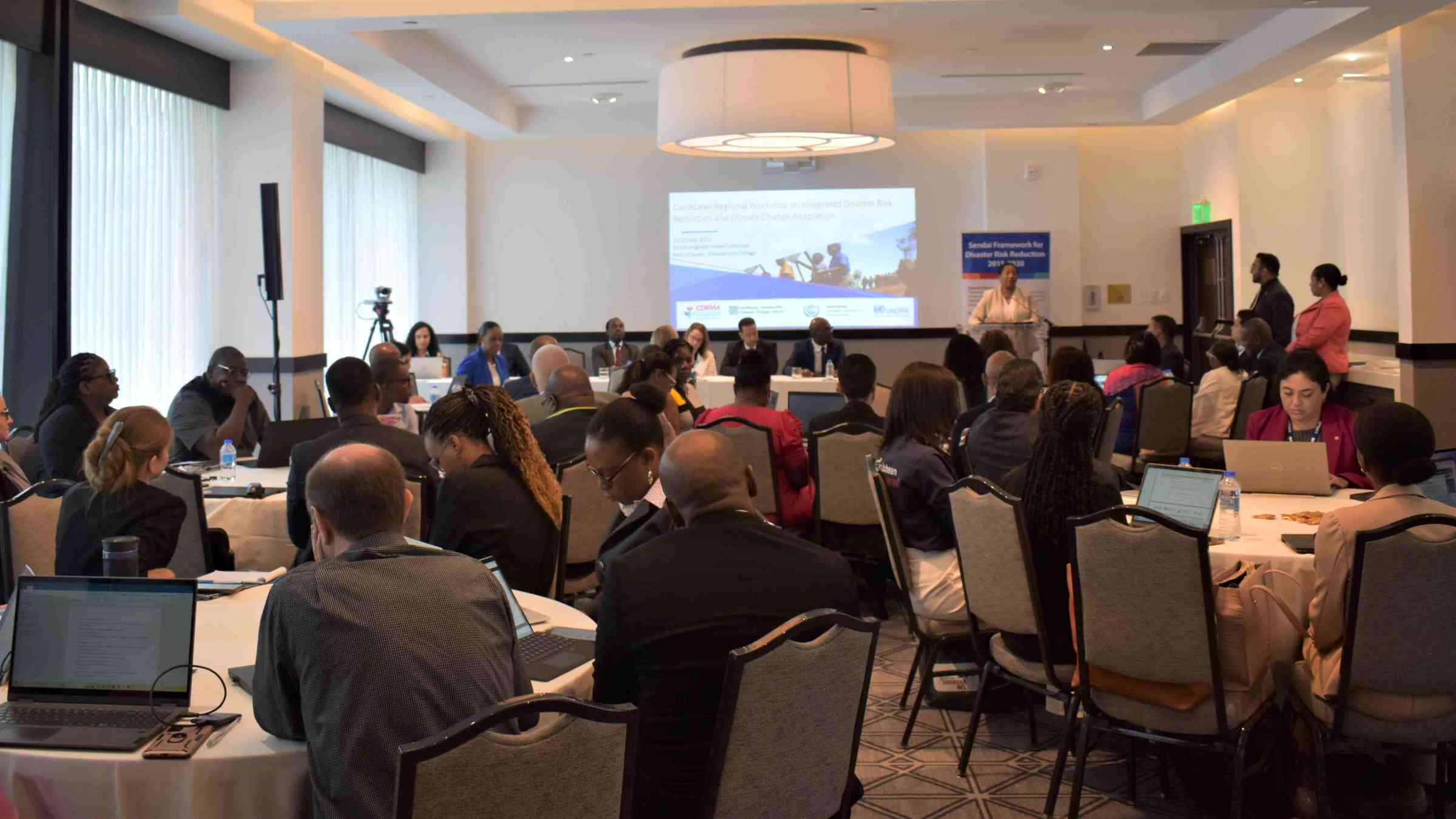Caribbean charts a roadmap for climate and disaster resilience through integrated approaches

A two-day regional Caribbean Regional workshop held in Port of Spain finalized with the discussion of a roadmap for an integrated disaster risk reduction and climate change adaptation approach in the Caribbean region.
The workshop involved the participation of more than 60 government officials from ministries responsible for disaster risk reduction and climate change adaptation from 18 Caribbean countries and representatives of regional and international organizations. The gathering provided an opportunity to discuss means for synergistic planning and implementation, while enhancing the understanding of the nexus between disaster risk reduction and climate change adaptation to avert, minimize and address losses and damages.
During the workshop, participants discussed the current understanding of and practices in DRR and CCA, while sharing examples of convergence within a common framework of resilience building. Participants highlighted the need for an integrated approach both from sectoral and vertical lenses, while outlining gaps and challenges in capacity, access to finance and national coordination. Tools and guidance supporting an integrated approach, were presented, such as the UNDRR’s comprehensive risk management tools, risk analytics through tracking of losses and damages (e.g. DesInventar) and repositories of climate and disaster risk data (e.g. RiX), Integrative Framework for NAPs and SDGs (NAP-SDG iFrame), etc.
Proven systemic practices that ensure a sound integration, e.g. nature-based solutions and early warning systems, were discussed. Presentations were also made by the CAF – Development Bank of Latin America, Green Climate Fund, United States Agency for International Development and UN Capital Development Fund to demonstrate how integrated approaches will help optimize climate and development financing.
Supported by the United Nations Office for Disaster Risk Reduction (UNDRR), in collaboration with the secretariat of the United Nations Framework Convention on Climate Change (UNFCCC), the workshop was co-organized by the Caribbean Disaster Emergency Management Agency (CDEMA) and the Caribbean Community
Climate Change Centre (CCCCC), and hosted by the Office for Disaster Preparedness and Management (ODPM) of Trinidad and Tobago.
The proposed roadmap has identified specific actions for national agencies, regional entities, and the United Nations. Priority will be given to strengthening national coordination capacities to ensure active engagement of all relevant actors around DRR and CCA. At the regional level, CDEMA and CCCCC will foster collaboration and discussion with and among their member states, using the country work programmes to inform national investment frameworks. The approach should include the development of an innovative financing mechanism, education, and training of local governments with a strategic approach to capacity development.
The roadmap will be accompanied by the efforts of global and regional actors; further alignment and coordination was mentioned as a specific area of focus for CDEMA and CCCCC. They also committed to facilitate funding for the outcomes of this process.
Participating members of the Executive Committee of the Warsaw International Mechanism, in particular its Technical Expert Group on Comprehensive Risk Management, committed to continue working to promote spaces to discuss and share knowledge and guidance on how to better integrate synergies between CCA and DRR. The UNFCCC secretariat highlighted the review of National Adaptation Plans (NAPs) as a key opportunity to promote synergies and committed to continue coordinating support through the UN for NAPs initiative.
The workshop was officially closed by the director of the ODPM, Major General (ret’d) Rodney Smart, together with high level representatives of CDEMA, CCCCC and UNDRR. Kester Craig, Deputy Executive Director of CDEMA highlighted the importance of ensuring collaboration at all levels: “For ensuring that countries benefit for an integrated approach it is necessary that this integration happens at all levels, from the community, to the national levels, passing by the regional and global institutions”.
Mr. Keith Nichols, Head of Programme Development and Management Unit of CCCCC, stated that the CCCCC is ready to work with both communities in order to ensure that resilience is reached: “the CCCCC commits to work with national disaster risk management organizations, as well as with national institutions responsible for climate change adaptation, aiming to secure international funding that will allow a better integration of policies, plans and the implementation of actions”.
Mr Animesh Kumar, Head of UNDRR’s Bonn Office, expressed that the organization will continue supporting the Caribbean region and countries through practical guidance and tools, global peer learning and sharing, and technical assistance on risk knowledge, policy and plan development and for the implementation of the EW4All initiative. “The workshop has shown that, data, policy and finance are common bases for synergy between adaptation and risk reduction. We should keep sectoral implementation and local action as convergence points for this synergy”, he added.